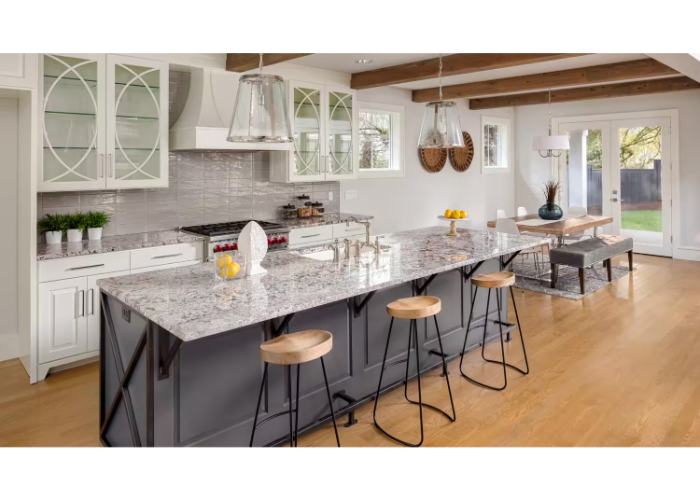Table of Contents
- Introduction to Natural and Engineered Stone
- What Is Natural Stone?
- Key Features of Natural Stone
- Benefits of Using Natural Stone
- What Is Engineered Stone?
- Key Features of Engineered Stone
- Benefits of Using Engineered Stone
- Natural Stone vs. Engineered Stone: Key Differences
- Composition and Appearance
- Durability and Maintenance
- Environmental Impact
- Cost Considerations
- Which Is Better for Your Home?
- How Goel World Offers Both Natural and Engineered Stone Solutions
- Conclusion
- FAQs about Natural and Engineered Stone
1. Introduction to Natural and Engineered Stone
Stone is a popular choice for flooring, countertops, and other interior surfaces due to its durability and timeless appeal. However, when choosing between natural stone and engineered stone, it’s important to understand the differences to determine which is best for your home. Natural stone, like marble and granite, is quarried from the earth, while engineered stone, such as quartz, is man-made. Each has its own unique advantages and considerations. In this article, we’ll explore the key differences between natural and engineered stone and help you make an informed decision for your home. Goel World offers a variety of high-quality natural and engineered stone options in Lucknow.
2. What Is Natural Stone?
Key Features of Natural Stone
Natural stone is quarried from the earth and comes in a variety of types, including marble, granite, sandstone, and slate. Each piece of natural stone is unique in terms of color, veining, and texture, making it a one-of-a-kind addition to your home. Natural stone is typically used for flooring, countertops, and wall cladding, providing a luxurious and timeless aesthetic.
Benefits of Using Natural Stone
- Aesthetic Appeal: Natural stone’s unique patterns and variations give it a stunning, natural beauty that cannot be replicated.
- Durability: Stones like granite and marble are known for their strength and longevity, making them ideal for high-traffic areas and countertops.
- Value Addition: Natural stone adds value to your home, making it a preferred choice for homeowners looking for premium materials.
- Cooling Properties: Natural stone tends to stay cool, which is a great benefit in India’s warm climate.
3. What Is Engineered Stone?
Key Features of Engineered Stone
Engineered stone is a man-made material composed of natural stone particles, resins, and pigments. Quartz is the most common type of engineered stone. The manufacturing process allows for greater control over color and consistency, giving it a more uniform appearance compared to natural stone. Engineered stone is primarily used for countertops, bathroom vanities, and flooring.
Benefits of Using Engineered Stone
- Consistent Appearance: Engineered stone has a uniform look, offering a sleek, modern aesthetic that many homeowners prefer.
- Low Maintenance: Engineered stone is non-porous, making it highly resistant to stains and easier to clean compared to natural stone.
- Durability: While not as hard as granite, engineered stone is durable and less prone to chipping or cracking than softer natural stones.
- Customizable: The manufacturing process allows for a wider variety of colors and patterns, making engineered stone more versatile in design.
4. Natural Stone vs. Engineered Stone: Key Differences
Composition and Appearance
- Natural Stone: Naturally occurring, each slab of natural stone is unique in terms of color, veining, and texture. Stones like marble and granite offer a timeless, luxurious look that enhances the aesthetic of any space.
- Engineered Stone: Made from crushed stone and resin, engineered stone offers a more uniform and consistent appearance. It can be customized to mimic the look of natural stone while offering a more contemporary design.
Durability and Maintenance
- Natural Stone: While extremely durable, natural stone is porous, meaning it can absorb liquids if not sealed properly. Regular sealing is required to maintain its appearance and prevent stains.
- Engineered Stone: Engineered stone is non-porous, meaning it resists stains and doesn’t require sealing, making it easier to maintain over time. However, it may not be as heat-resistant as natural stone.
Environmental Impact
- Natural Stone: Quarrying natural stone has a significant environmental impact due to the extraction process. However, it is a natural material with a long lifespan, which reduces the need for replacements.
- Engineered Stone: Engineered stone has a smaller environmental footprint as it uses recycled stone particles. However, the resin used in the manufacturing process is synthetic, which is less eco-friendly than purely natural materials.
Cost Considerations
- Natural Stone: Natural stone tends to be more expensive due to the labor-intensive quarrying and transportation process. The price can vary significantly depending on the rarity and type of stone.
- Engineered Stone: Engineered stone is generally more affordable than high-end natural stone options. Its consistent appearance and low maintenance needs also make it cost-effective in the long run.
5. Which Is Better for Your Home?
The choice between natural stone and engineered stone depends on your specific needs and preferences. If you value uniqueness, timeless beauty, and natural aesthetics, natural stone may be the better option. However, if you prefer a more modern look, ease of maintenance, and a wider range of color options, engineered stone may be more suitable. Goel World offers expert guidance to help you select the best stone option for your home, ensuring that you get the right balance of aesthetics, durability, and cost.
6. How Goel World Offers Both Natural and Engineered Stone Solutions
Goel World provides a diverse range of both natural and engineered stone to suit your home’s flooring, countertops, and wall cladding needs. Whether you’re drawn to the elegance of marble and granite or the versatility of engineered quartz, our experienced team can help you find the perfect stone solution for your project. We pride ourselves on offering high-quality materials sourced from trusted manufacturers, ensuring durability, beauty, and value for your home.
7. Conclusion
Both natural and engineered stones have their own unique advantages. Natural stone offers unmatched beauty and individuality, while engineered stone provides a modern look with low maintenance. When choosing the right material for your home, consider your design goals, budget, and maintenance preferences. Whether you opt for natural or engineered stone, Goel World in Lucknow is your go-to supplier for high-quality stone products that elevate the aesthetics and functionality of your space.
8. FAQs about Natural and Engineered Stone
Q1: What is the primary difference between natural and engineered stone?
Natural stone is quarried from the earth and offers unique patterns, while engineered stone is man-made and provides a more uniform appearance.
Q2: Is engineered stone more durable than natural stone?
Engineered stone is less prone to staining and easier to maintain, but natural stones like granite are harder and more resistant to heat.
Q3: Does natural stone require more maintenance than engineered stone?
Yes, natural stone requires regular sealing to prevent staining, while engineered stone is non-porous and easier to maintain.
Q4: Which is more eco-friendly: natural or engineered stone?
Natural stone is a natural material, but the quarrying process impacts the environment. Engineered stone uses recycled materials but involves synthetic resins.
Q5: Where can I find high-quality natural and engineered stone in Lucknow?
Goel World offers a wide variety of natural and engineered stone, helping you choose the best material for your home’s design and functionality.






